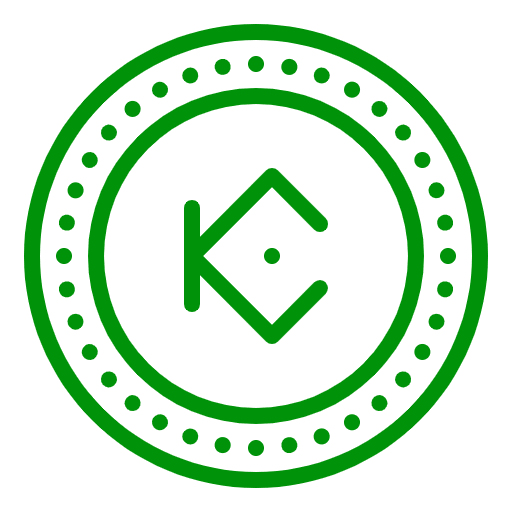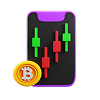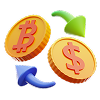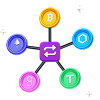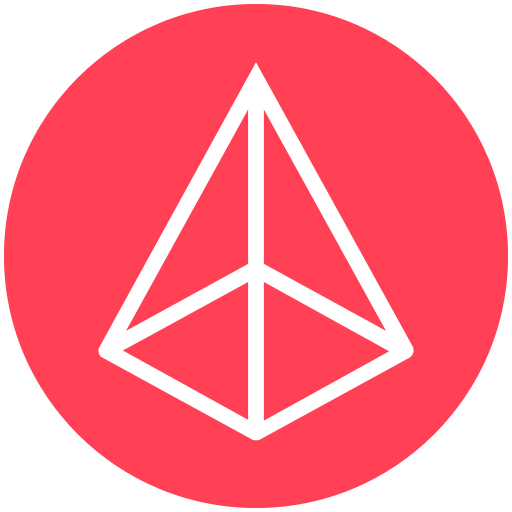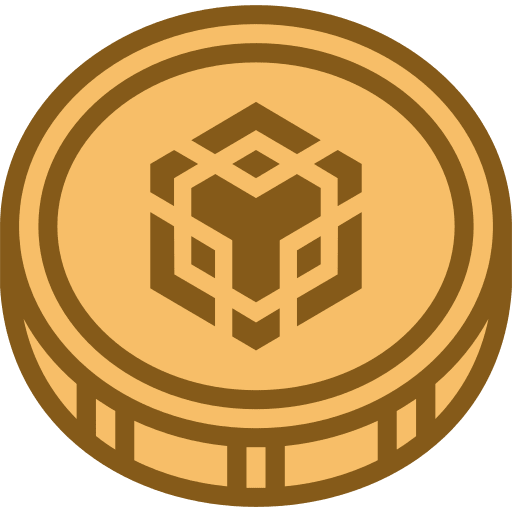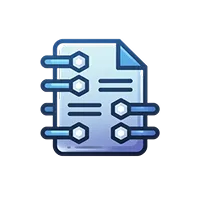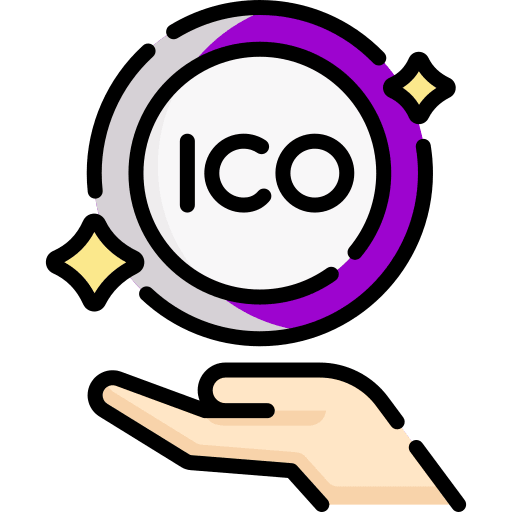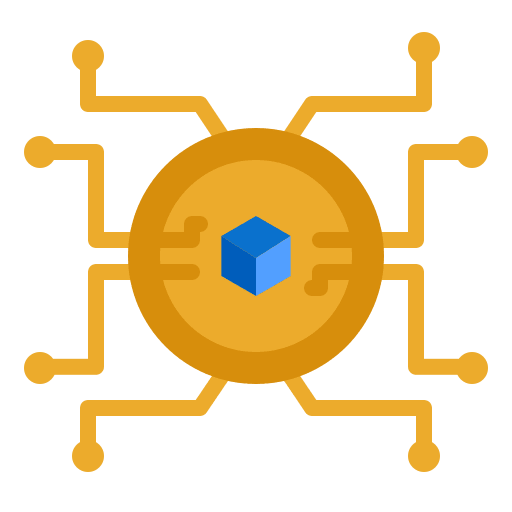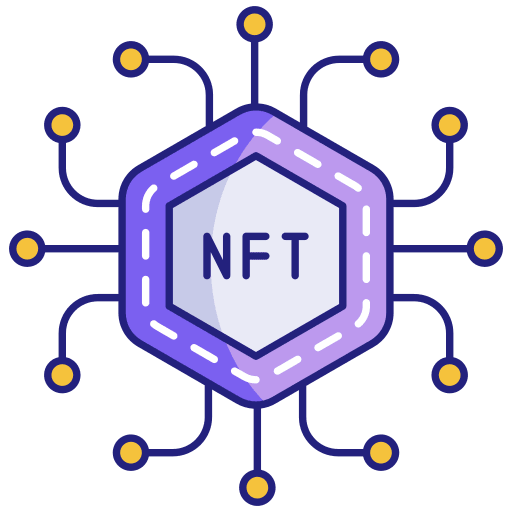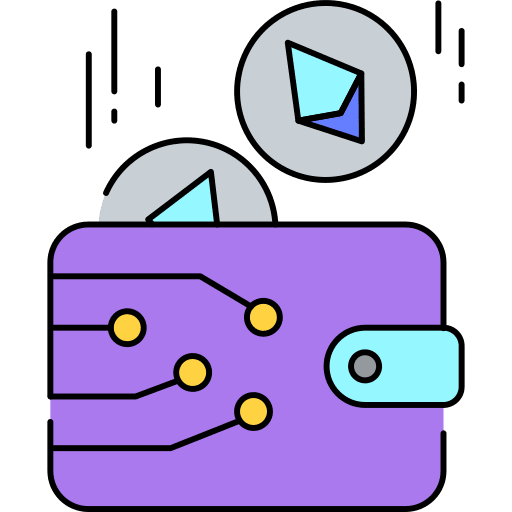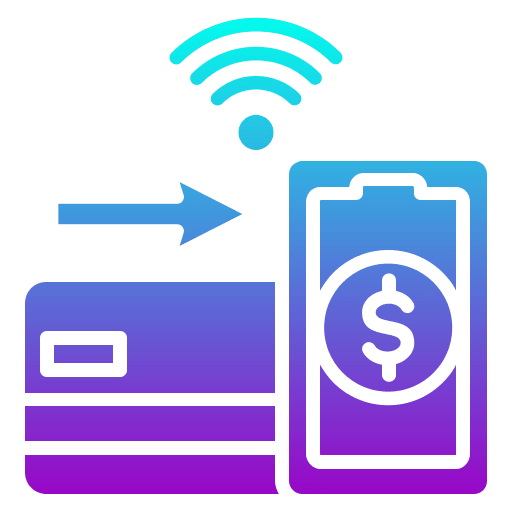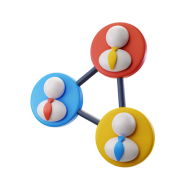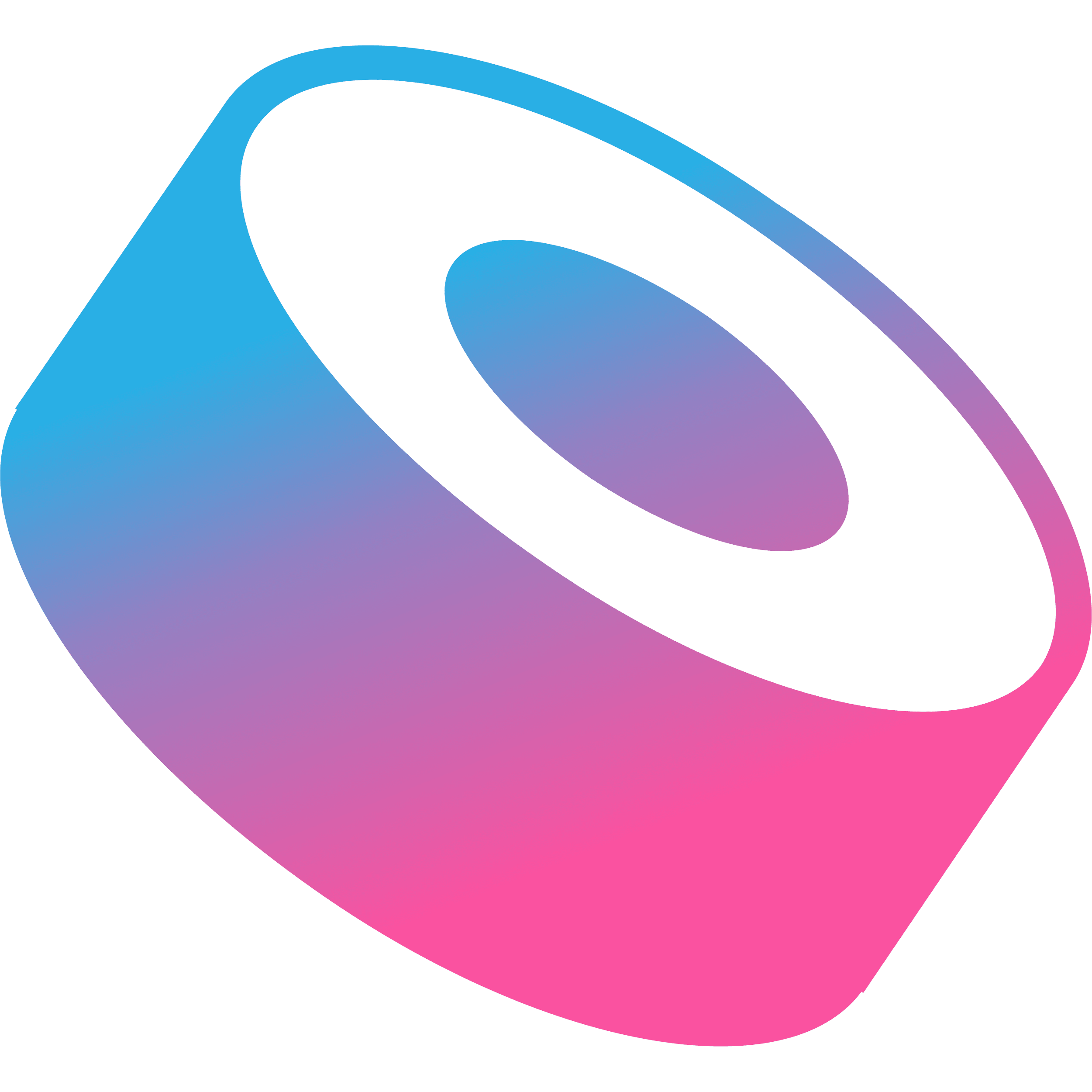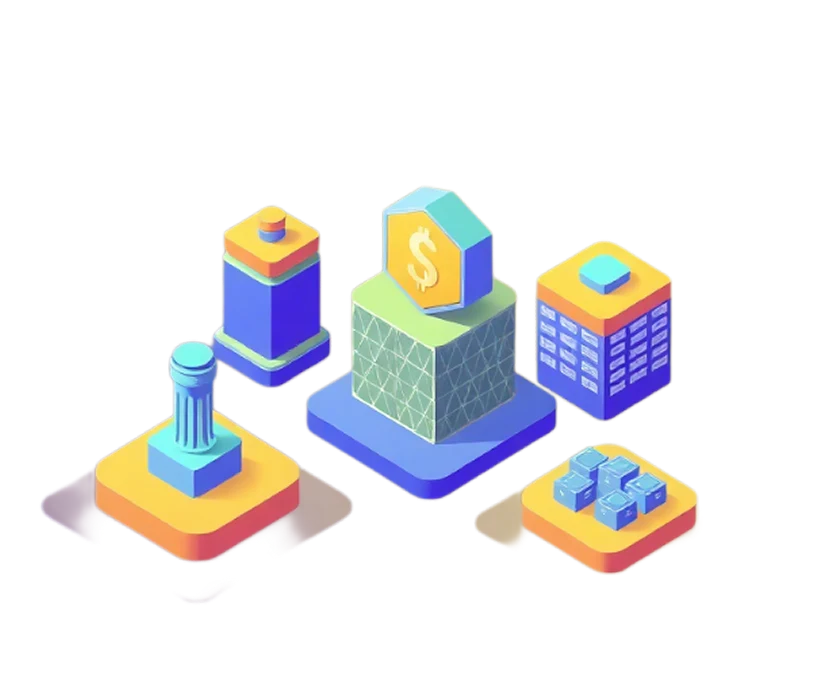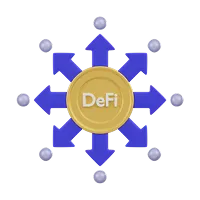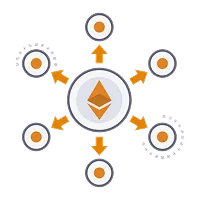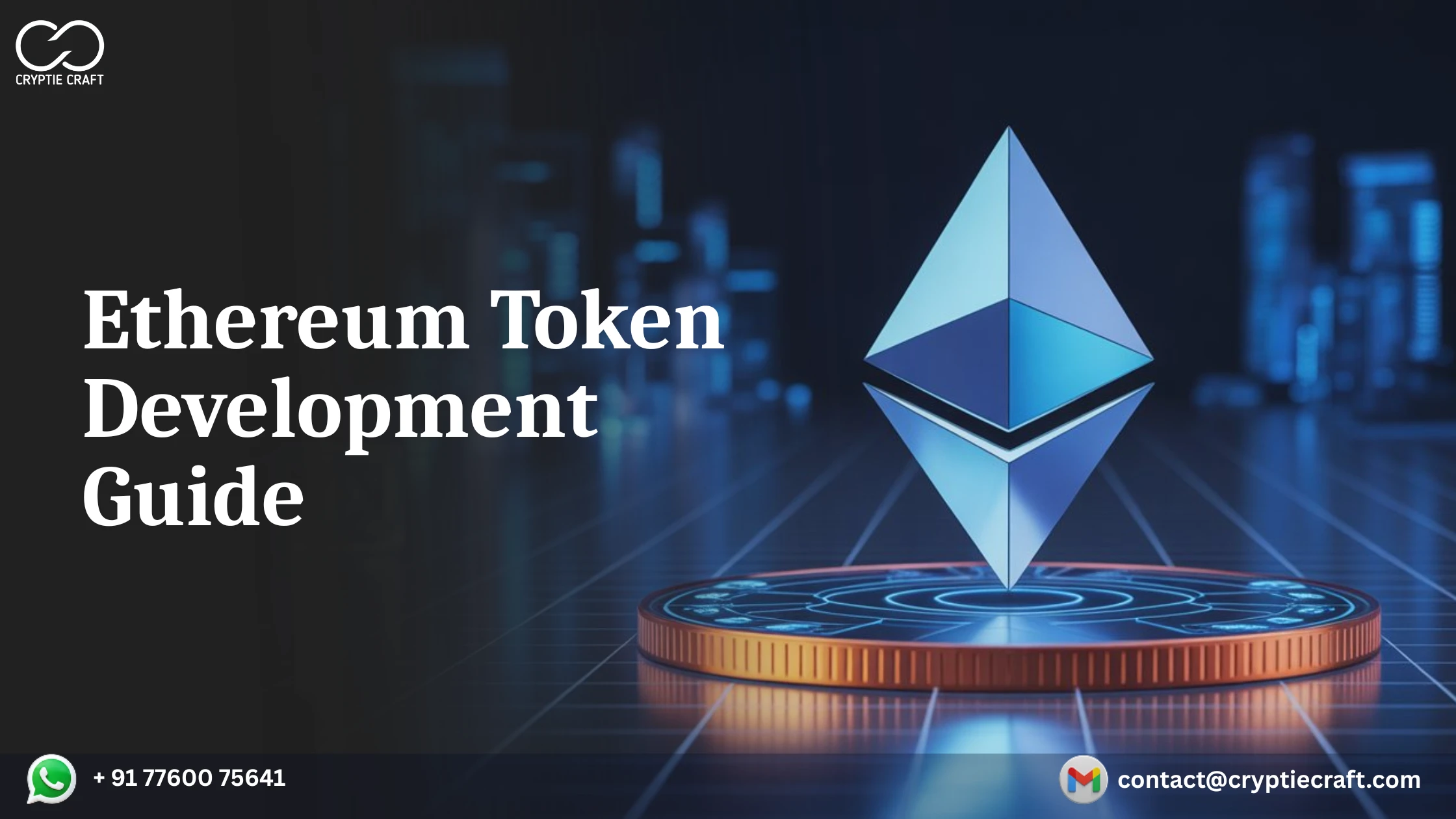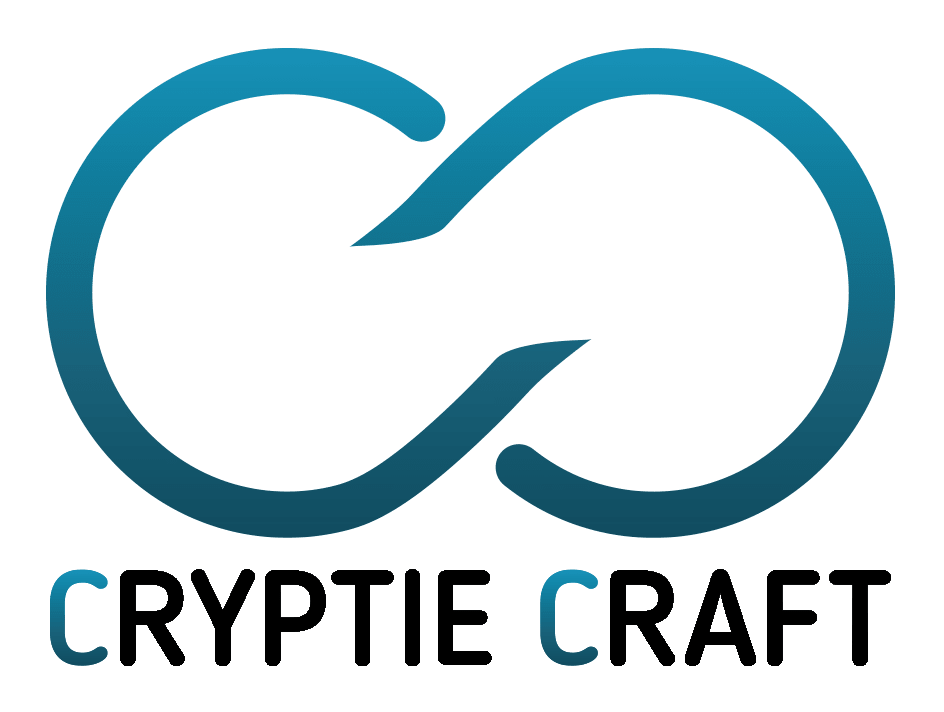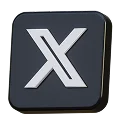Have you ever thought about how a crypto wallet automatically recognizes thousands of other tokens? The answer is Ethereum token standards, simple rules that make everything work together smoothly. Just like how all USB devices fit into any USB port, these standards ensure that tokens work seamlessly across different wallets, exchanges, and apps without hassle. Token standards define how digital tokens behave on a Blockchain network. Without these standards, tokens cannot interact with wallets, exchanges, or decentralized applications.
You can trade ERC-20 as tokens and you can collect ERC-721 NFTs as digital art, and you can use ERC-1155 tokens for Blockchain games. This guide provides an explanation of Ethereum token standards to demonstrate their significance to your digital asset development process.
Understanding Ethereum Tokens
An Ethereum token represents a digital asset created on the Ethereum Blockchain through smart contracts by using the established Ethereum token standards of ERC-20, ERC-721, and ERC-1155. The token standards provide universal compatibility, allowing all crypto wallets, decentralized exchanges, and decentralized applications (dApps) to work together without problems throughout the Web3 ecosystem. Ethereum tokens enable the representation of multiple asset types, including cryptocurrencies, governance voting rights, membership credentials, non-fungible tokens (NFTs), and Blockchain gaming collectibles and tokenized real-world assets such as real estate.
Overview of Ethereum Token Standards
Ethereum token standards are essential blueprints to create Ethereum tokens, it defines how digital assets function, interact, and maintain compatibility across wallets, exchanges, and the decentralized applications ecosystem.
ERC-20
The foundational fungible token standard enables cryptocurrencies and DeFi tokens to use basic functions like transfer, balance checking, and approval mechanisms. All cryptocurrencies and DeFi tokens must have.
ERC-721
The ERC-721 is a type of non-fungible token standard used for creating unique, indivisible digital assets perfect for NFTs, collectibles, and representing individual ownership of distinct blockchain items.
ERC-1155
The multi-token standard enables single smart contracts to handle both fungible and non-fungible tokens through efficient management, and also makes it suitable for gaming and metaverse environments.
ERC-777
The advanced fungible token standard provides better capabilities than ERC-20 through its hook system and operator control functions, and its advanced security features to protect complex transactions.
ERC-1400
The security token standard establishes a framework for regulated financial assets that enables companies to transform their stocks, bonds, and real estate into compliant tokens through its built-in compliance features.
ERC-223
ERC-223 is an enhanced token standard that protects users from losing their tokens because it blocks any token transfer that would go to an incompatible contract, thus increasing safety beyond what ERC-20 provides.
ERC-998
ERC-998 is a composable NFT standard that enables tokens to own other tokens, creating hierarchical asset structures that serve complex digital ownership and bundled assets, complex portfolios, and advanced blockchain ecosystems.
Understanding these Ethereum token standards is crucial for effective Ethereum token development, enabling developers to choose optimal protocols matching their project requirements.
Why Choose Ethereum for Token Development
Ethereum is the premier platform for token development due to its unmatched ecosystem maturity, high security, and industry-standard protocols like ERC-20, ERC-721, and ERC-1155. It offers robust smart contract functionality for automation, high liquidity for trading, and extensive developer support, making it ideal for creating diverse, secure ad interoperable digital assets.
Proven and Secure Smart Contract Ecosystem
The Ethereum platform functions as a tested smart contract solution that handled more than one billion transactions since its 2015 launch, while its security system undergoes ongoing audits and enhancements.
Industry-Standard ERC Token Support
The token standards of Ethereum include ERC-20 and ERC-721 to provide users with universal access to thousands of wallets and exchanges and decentralized applications that operate worldwide.
Large developer and tooling ecosystem
The developer community maintains virtual platforms for users to access comprehensive documentation and utilize Hardhat and Truffle frameworks and other resources to enhance their token development process on Ethereum.
High network security and decentralization
The Ethereum proof-of-stake network relies on thousands of validator nodes to achieve decentralized operation and protect against censorship, security threats, and system manipulation.
Easy DeFi, NFT, and exchange integration
Ethereum’s established infrastructure enables seamless integration with major DeFi protocols, NFT marketplaces, major centralized exchanges, and cutting-edge Web3 applications across the ecosystem.
Ethereum’s combination of security, industry trust, and technical versatility makes it the leading choice for startups looking to build robust, future-ready, and compliant digital assets.
Ethereum Token Development Company – Cryptiecraft
Cryptiecraft stands as an Ethereum token development company offers complete Blockchain services to create your complete business vision. Our expert team specializes in developing custom ERC-20, ERC-721, and ERC-1155 tokens tailored to your specific business needs, whether you’re launching DeFi protocols, NFT marketplaces, or tokenized assets. Our security-first development approach, together with our complete smart contract auditing services and ongoing support after deployment, helps us achieve long-term success for your token. We have established ourselves as a reliable partner for innovative token solutions through our proficiency in Ethereum token development and regulatory compliance, and our ability to enable projects to launch smoothly in the competitive Blockchain industry.
Key Components of Ethereum Token Development
Successful Ethereum token development requires strategic planning across smart contract development, tokenomics design, distribution strategies, and technical integration to create digital assets that can compete in the market and function as complete products.
Smart Contract Programming (Solidity, Vyper)
Smart contract development using Solidity or Vyper languages creates the foundational code that controls all token activities, security measures, operational capabilities, and interaction processes on the Ethereum blockchain.
Tokenomics & Supply Models
Strategic tokenomics design determines total supply, distribution mechanisms, inflation rates, burning schedules, and economic incentives that drive long-term token value and sustainability in the token.
Token Distribution & Vesting
The complete token launch strategy encompasses scheduled distribution phases, team and investor vesting periods, airdrop distributions, and fair allocation systems protects against market manipulation and price drops.
Wallet & Exchange Compatibility
Token holders can access their tokens through multiple channels because the system enables smooth connections with major crypto wallets such as MetaMask, hardware wallets, and both centralized and decentralized exchanges.
Your Ethereum token achieves technical excellence and market success when you master all components, which include smart contract development, tokenomics, and token launch strategy.
End-to-End Ethereum Token Development Services
Complete Ethereum token development services provide complete support for all development processes. It includes everything from custom token creation and smart contract audit to exchange integration, ensuring secure, compliant launches.
Custom Token Creation
We create custom utility tokens with platform access and governance tokens, which enable DAO members to vote, and security tokens, and also meet regulatory standards for asset tokenization according to your business needs.
Wallet Integration
Ethereum token development services include seamless wallet integration with MetaMask, Trust Wallet, and hardware wallets, plus intuitive user interfaces, which significantly enhance the token holder experience.
Smart Contract Auditing & Security Assurance
The smart contract auditing process uses strict protocols that detect security flaws and confirm code accuracy while validating security requirements to safeguard your token against attacks and operational breakdowns after launch.
Exchange Listing & Liquidity Support
We support your token’s success by managing listings on major centralized and decentralized exchanges while creating liquidity pools and executing market-making operations to maintain optimal trading conditions.
These integrated services ensure your token project receives comprehensive support from conception through launch and beyond, maximizing security, usability, and long-term market viability effectively.
Why Ethereum Token Still Leads Web3
Ethereum tokens maintain their dominance over Web3 because of their fundamental strengths, developer activity, and complete development tools. They also deliver dependable performance, create new possibilities, and maintain user trust across all decentralized applications.
Developer Community Size
Ethereum has the largest developer community because it enables developers to create innovations while maintaining platform development through their work on documentation, knowledge sharing, and fast problem-solving, which improves global Ethereum token standards.
Tooling & Infrastructure
The combination of OpenZeppelin and Hardhat provides powerful development tools that enable developers to create, tests and deploy smart contracts, by making Ethereum tokens more secure and improving their development speed and worldwide scalability.
Network Security & Decentralization
The decentralized structure of Ethereum, along with a verified security system, protects tokens against all types of threats, which establishes trust and transparency and creates resilient systems that support global Web3 application growth.
Ethereum tokens maintain their status as the core element of Web3 because they represent the unbreakable foundation for worldwide decentralized ecosystem development through their superior developer talent, sophisticated infrastructure, and advanced security features.
Core Features of Our Ethereum Token Development
The Ethereum token development services provide businesses with flexible, secure, and scalable solutions to develop Ethereum tokens that meet regulatory standards and operate effectively in multiple blockchain environments.
Custom ERC Token Creation
We develop customized ERC tokens by complying with Ethereum token standards and meeting business requirements for compliance, operational capacity, and future growth.
Tokenomics & Supply Model Design
It establishes the framework for supply distribution and governance allowing users to participate while maintaining value through controlled inflation.
Wallet & Exchange Compatibility
Ethereum tokens provide built-in support for major wallets and exchanges which allows users to execute transactions and conduct trading activities while accessing the entire market.
Smart Contract Upgradeability
This feature enables existing token functions to receive new features, error resolutions, and security updates without affecting current token functions and user account balances.
Cross-Chain Integration Support
It functions across various blockchains through cross-chain integration, enhancing their liquidity and interoperability while enabling them to enter new Web3 markets.
Our Ethereum token development services enable startups to develop securely through its powerful features, intelligent design, and modern system connections to drive user adoption, product value, and permanent blockchain achievements.
Security Features of Our Ethereum Token Development
Security is central to our Ethereum token development solutions, ensuring smart contracts are resilient, compliant, and protected against vulnerabilities, exploits and unauthorized access.
- Smart Contract Audits
- Role-Based Access Control
- Secure Wallet Management
- Data Encryption
- Reentrancy & Overflow Protection
- Minting & Burning Controls
- Pausable Contract Functionality
- Gas Optimization & Safe Math Usage
- Front-Running & MEV Attack Prevention
- Continuous Monitoring
With a strong focus on security, these Ethereum tokens deliver dependable performance, enhanced user confidence, and long-term protection for decentralized applications and token ecosystems.
Add-on Features of Our Ethereum Token Development
Our add-on features enhance Ethereum token functionality by improving user engagement, governance, analytics, and scalability, which helps projects develop into strong utility-based Web3 ecosystems.
Staking & Reward Mechanisms
This feature enables users to lock their tokens which results in reward earnings that will enhance their network participation and they will hold their tokens for an extended period.
Advanced tokens analytics & dashboard
Analytics dashboards provide real-time insights into token performance, transactions, holders, and supply metrics for informed decision-making.
Governance & DAO integration
DAO integration enables token holders to propose, vote, and govern decisions transparently through decentralized governance mechanisms.
Multi-chain token support
Multi-chain support allows Ethereum tokens to operate across blockchains to achieve greater market presence and liquidity while building connections between different ecosystems.
Admins & Issuer control panels
Admin panels give issuers secure control over token settings, permissions, monitoring, and operational management efficiently.
These add-on features transform Ethereum token standards into scalable, interactive, and governance-ready assets supporting decentralized platforms to achieve growth, transparency, and long-term success.
Use Cases & Real-World Examples of Ethereum Token Development
Creating an Ethereum token powers diverse Blockchain applications, showcasing real value through DeFi token examples that demonstrate utility, scalability, and innovation across decentralized financial ecosystems.
- Tokens & Protocol Rewards
- Cryptocurrency Tokens
- DeFi Applications
- NFT Marketplaces
- Security Tokens
- Utility Tokens
- Governance Tokens
- Gaming Tokens
- Stablecoins
- Tokenized Loyalty Programs
- Crowdfunding & ICOs
From startups to global organizations, enterprise token use cases prove that Ethereum token development delivers secure, flexible, and scalable solutions across industries and evolving Web3 markets.
Ethereum Wallet Development
Ethereum wallet development is essential for managing digital assets securely while ensuring smooth interaction with decentralized applications and smart contracts. A well-built wallet supports multiple Ethereum token standards, fast transactions, and reliable exchange integration. As a leading Ethereum token development company, we build wallets with complete token compatibility, advanced security layers, and intuitive user experiences. Our wallet solutions empower businesses to support ERC tokens, DeFi protocols, and NFTs efficiently, enabling seamless asset management, broader adoption, and long-term scalability within the evolving Ethereum ecosystems.
Complete Ethereum-Native Integration Across the Ecosystem
The Ethereum ecosystem enables smooth token operations between wallets and exchanges and decentralized applications to get an improved user experience, greater market reach, and uninterrupted blockchain system access.
Wallet Integration
Using wallet integration, users can securely store and send Ethereum tokens while managing their digital assets with MetaMask and Trust Walletboth of which serve as popular cryptocurrency wallets.
DEX and CEX Support
The DEX and CEX exchanges support Ethereum tokens to be traded on both decentralized and centralized platforms, resulting in increased market accessibility and improved trading liquidity.
dApp Integration
dApp integration facilitates Ethereum tokens to function correctly with decentralized applications while supporting essential operations such as payments, governance and user engagement activities.
The deep integration of tokens with the Ethereum ecosystem results in better project visibility and usability, and liquidity for projects, which helps them achieve faster growth and success in the expanding Web3 environment.
Future Trends in Ethereum Token Development
Presently, Ethereum is a widely utilized blockchain network with multiple token standards. They have turned into emerging tokenization technologies with layer-2 and Ethereum 2.0 solutions. With features like interoperability, high compliance regulations, and global adoption, they are unbeatable in the crypto industry. New features and functionalities are integrated into the blockchain for enhanced protection.
Step-by-Step Process to Develop an Ethereum Token
A clear roadmap helps startups plan, build, and launch an Ethereum token efficiently while reducing risks and ensuring long-term success.
Define Token Purpose and Use Case
The token requires a precise definition of its practical applications and intended users, and the specific problem it addresses within the Ethereum blockchain.
Choose the Right Ethereum Token Standard
The selection of an Ethereum token standard requires analyzing its operational capabilities and system growth potential. Also, it has to work with different wallets, exchanges, and applications.
Design Tokenomics and Supply Structure
The token supply and distribution, incentives, and governance model require design in order to create sustainable value for the ecosystem and its various components.
Develop and Test Smart Contracts
The team creates secure smart contracts & conducts multiple testing procedures to identify and resolve all potential bugs, vulnerabilities, and operational failures before they launch.
Deploy Token on Ethereum Network
The token is launched on the Ethereum network through proper system setup and optimization of gas fees and compatibility with various network functions.
Integrate Wallets, Exchanges, and dApps
The token is integrated with wallets, exchanges, and decentralized applications to create user-friendly systems that support trading and capitalizing on user demand.
The implementation of an organized Ethereum token development pathway guarantees that Blockchain projects will achieve secure system deployment, efficient system integration, and future system growth capabilities.
Tech Stack to Create an Ethereum Token
The right tech stack ensures secure, scalable, and efficient Ethereum token creation, supporting smart contract development, testing, deployment, and seamless ecosystem integration.
- Blockchain Platform: Ethereum
- Smart Contract Language: Solidity
- Token Standards: ERC-20, ERC-721, ERC-1155, ERC-777
- Smart Contract Libraries: OpenZeppelin
- Development Frameworks: Hardhat, Truffle
- Testing Tools: Mocha, Chai
- Wallet Integration: MetaMask, Trust Wallet
- Node Providers: Infura, Alchemy
- Frontend Technologies: React.js, Next.js
- Web3 Libraries: Web3.js, Ethers.js
- Backend Technologies: Node.js, Python
- Database: MongoDB, PostgreSQL
- Security Tools: Slither, MythX
- Version Control: Git, GitHub
- Deployment Networks: Ethereum Testnets, Ethereum Mainnet
Why Choose Cryptiecraft as Your Ethereum Token Development Partner?
Building your token with Cryptiecraft, a trusted crypto token development company, ensures a smooth and well-guided Blockchain journey from start to finish. The experts at Cryptiecraft, who specialize in developing Ethereum tokens, will guide your complete Blockchain development process through their token development services. We provide complete project supporting all stages from initial token design to final token testing and subsequent system maintenance. Our team develops secure and scalable systems to meet actual business needs through our extensive expertise. At Cryptiecraft, we establish long-term business relationships by providing ongoing technical assistance and maintaining clear project updates with our customers. Our extensive industry knowledge, combined with our business-oriented strategy, enables us to assist companies in creating Ethereum tokens that follow practical standards, future requirements, and legal obligations, and a user-friendly design for sustainable business expansion.
Frequently Asked Questions
Q1. What is Ethereum token development?
Ans: Ethereum token development involves creating digital assets on the Ethereum Blockchain using smart contracts to allow secure transfers, automation, and integration with decentralized applications.
Q2. How much does it cost to develop an Ethereum token?
Ans: The cost required to develop an Ethereum token depends on token complexity, features, security requirements, integrations and development expertise, making each project unique in scope and investment.
Q3. What are the common mistakes to avoid when developing an Ethereum token?
Ans: Common mistakes to avoid when developing an Ethereum tokens is that including weak smart contract security, unclear token utility, poor tokenomics planning, limited testing, and ignoring compliance and long-term scalability needs.
Q4. How long does it take to create and launch an Ethereum token?
Ans: The time taken to create and launch an Ethereum token might take a few days, depending on token design, development approach, testing depth, audit processes, and integration requirements across the Ethereum ecosystem.
Q5. Which blockchain wallets support Ethereum tokens?
Ans: Ethereum tokens support popular wallets like MetaMask, TrustWallet, Coinbase Wallet, MyEtherWallet, Ledger, Trezor, Exodus, Rainbow, Argent and SafePal.
Q6. What are the future trends of Ethereum Token Development?
Ans: Future trends of Ethereum token development involve modular smart contracts, AI-driven automation, real-world asset tokenization, enhanced compliance tooling, and seamless integration across blockchain ecosystems.
Q7. Are Ethereum tokens suitable for DeFi, NFTs, and enterprise applications?
Ans: Yes, Ethereum tokens are suitable for DeFi, NFTs and enterprise use cases due to flexibility, strong security, ecosystem maturity and seamless integration with Blockchain platforms.
Q8. How do I list an Ethereum token on centralized and decentralized exchanges?
Ans: Listing an Ethereum token on centralized and decentralized exchanges requires smart contract verification, sufficient liquidity, security reviews, platform compliance, and successful integration with trading and wallet systems.
Q9. What is the role of smart contracts in Ethereum token development?
Ans: Smart contracts role in Ethereum token development defines token behavior, automates transactions, enforces rules, and ensures trustless execution across wallets, exchanges and DEX applications.
Q10. Are Ethereum tokens legally compliant across different jurisdictions?
Ans: Ethereum tokens are legally compliant, and it depends on regional regulation, token purpose, usage model, and governance structure, requiring careful review before public distribution.


